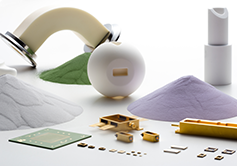Fine Ceramics, sometimes referred to as "advanced ceramics," are engineered materials that support the development of cutting-edge technology.
- HOME
- Characteristics of Fine Ceramics
- Strength - Specific gravity
Strength (4)
Specific Gravity (Density) to Provide Strength and Lightweight Properties
Fine Ceramics (also known as "advanced ceramics") are lighter than high-strength metals. Within the same volume, many Fine Ceramic materials weigh only half as much as metal counterparts.

Applications: Turbocharger rotors and other related products.
Description
Specific Gravity
Density refers to a material's mass per cubic centimeter, while specific gravity refers to the density ratio between a given material and water, where water is assigned a value of 1. Many Fine Ceramic materials have specific gravities less than half those of ferrous metals.
Specific Gravities

For more information, please see Excerpt of Graph Values.
The term "Fine Ceramics" is interchangeable with "advanced ceramics," "technical ceramics" and "engineered ceramics." Use varies by region and industry.
People who read this page also read.

Strength (1)
Strength (1)
Extreme Hardness Surpassing that of Metals
Extreme Hardness Surpassing that of Metals
Characteristics of Fine Ceramics

Strength (2)
Strength (2)
Rigidity—Less Elastic Deformation Compared to Metals
Rigidity—Less Elastic Deformation Compared to Metals
Characteristics of Fine Ceramics

Strength (3)
Strength (3)
Toughness—Highly Resistant to Fracturing
Toughness—Highly Resistant to Fracturing
Characteristics of Fine Ceramics

Different Types of Fine Ceramics
Different Types of Fine Ceramics
Wide Variety of Products to Support both Industry and Society
Wide Variety of Products to Support both Industry and Society
Introduction to Fine Ceramics

Fine Ceramics at Work in the Deep Sea
Fine Ceramics at Work in the Deep Sea
Playing an Important Role in Submarine Earthquake Observation
Playing an Important Role in Submarine Earthquake Observation
Learning about Fine Ceramics
If you want to use ceramics in business, click here.
Kyocera's Fine Ceramics products (All websites below open in a separate window.)
Product Category
 Semiconductor / LCD Processing Equipment
Semiconductor / LCD Processing Equipment
 Life / Culture / Industrial Machines
Life / Culture / Industrial Machines
 Wireless Communications
Wireless Communications
 Computer Peripherals
Computer Peripherals
 Environmental Preservation / Renewable Energy
Environmental Preservation / Renewable Energy
 Medical Equipment / Devices
Medical Equipment / Devices
 Single-Crystal Sapphire Products
Single-Crystal Sapphire Products
 Metallized / Vacuum Components
Metallized / Vacuum Components
 Electronics Industry
Electronics Industry
 Heaters
Heaters
 Piezoelectric Ceramics
Piezoelectric Ceramics
Search by Material
 Alumina
Alumina
 Silicon Nitride
Silicon Nitride
 Silicon Carbide
Silicon Carbide
 Sapphire
Sapphire
 Zirconia
Zirconia
 Cordierite
Cordierite
 Yttria
Yttria
 Aluminum Nitride
Aluminum Nitride
 Cermet
Cermet
 Mullite
Mullite
 Steatite
Steatite
 Forsterite
Forsterite
Search by Property/Characteristic


- Thermal Properties
- Coefficient of Thermal Expansion
- Thermal Conductivity
- Heat Shock Resistance

- Electrical Properties
- Insulation / Semiconductivity

- Chemical Properties
- Chemical Resistance










